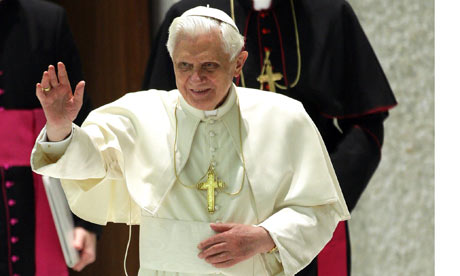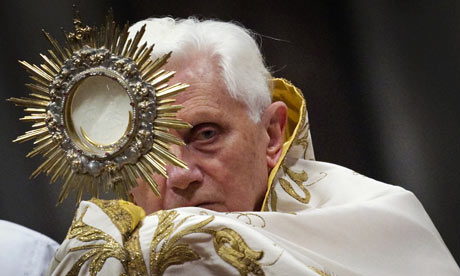On Sunday I appeared on The Big Questions on BBC1 to discuss whether the pope should "resign". It quickly descended into a heckling circus where calmly reasoned argument fell victim to unfocused outrage. Afterwards, two representatives of the Protest the Pope Coalition told me menacingly I had "no right" to defend Benedict XVI's record on abuse.
But shouting down the truth doesn't make it go away. I don't defend the pope because I think it is the duty of a good Catholic; I defend him because he is completely innocent of the charges made against him, and because the media has merged with the mob and misreported the facts.
The three recent stories from the US cited by Richard Dawkins and his mob as "proving" that the pope should be arrested under international law – the horrible cases of Murphy in Wisconsin, Teta and Trupia in Arizona, and now Kiesle in California – have this in common: the abuse took place in the 1970s; the police were informed and acted; the priest was suspended by his bishop; requests for dismissal from the clerical state ("defrocking") were sent to Cardinal Ratzinger's department in the Vatican, the Congregation for the Doctrine of the Faith; and some time later the priests were defrocked – except in the case of Murphy, who died during his trial.
Suspension and defrocking are two separate actions. The first can be done by a bishop, with immediate effect; the second is a lengthy process that involves Rome. Suspension – meaning a priest is no longer able to function as a priest – say mass, hear confession, act as chaplain etc – is the key action that a bishop has to take against an abusive priest to prevent him having contact with minors. If, in any of these "smoking gun" cases, the bishop failed to suspend an abusive priest immediately, he did wrong. But such failure would have had nothing to do with Cardinal Ratzinger, whose only involvement was when a request for defrocking landed on his desk.
The time Rome took over each defrocking says nothing whatsoever about cover-up or collusion. It says only that defrocking was then a complex and elaborate procedure that took too long. However, what prevented the abuse was not the defrocking but the suspension by the bishop. There is no link between the length of the defrocking process and the priest's opportunity to abuse. In fact, in the case of Kiesle, most of the abuse for which he was convicted took place after he was defrocked, when his bishop had no more control over him.
But wasn't Ratzinger in charge while all this was going on? Didn't it happen on his watch? No. From 1981 to 2001 he was in charge of a department that dealt with defrocking, but not with suspensions and penalties for paedophile priests, which were the responsibility of local bishops. A number of bishops failed to suspend the abusive priests, some of whom continued to abuse. That is the scandal. It has been exposed and dealt with, and a number of bishops have, as a result, resigned. More important, guidelines are now in place to prevent it ever happening again.
Not only was Cardinal Ratzinger not complicit in these failures, he was the Vatican official who most clearly saw what was needed to tackle the problem. Then, in 2001, Pope John Paul asked him to review the local churches' handling of clerical abuse cases. Cardinal Ratzinger asked bishops around the world to forward to him all cases where credible allegations had been made against priests.
He did this not to "cover up" the crimes – which had been reported to the local police – but to ensure that the priests were more speedily dealt with. He accomplished this by amending the procedure for defrocking to allow for a fast-track procedure that did not involve trials.
Some try to make out that Cardinal Ratzinger's 2001 letter orders a cover-up by insisting that parties observe secrecy under pain of excommunication. What it actually says is that confidentiality should be observed during church trials, to allow the victims to give evidence freely and to protect the accused until found guilty. There is nothing in that letter preventing victims reporting the case to the police, and the assumption is that they should.
Pope Benedict is not responsible for cover-up, collusion, turning a blind eye, institutional idolatry or any of the other accusations that, with greater or lesser vehemence, have been hurled at the Catholic church during recent weeks. On the contrary, he is the one in the Vatican who has done most to rid the church of this scourge. He is the one who has acted most consistently and energetically to improve the church's handling of these cases.
The Pope Should Stand Trial
Why is anyone surprised when Christopher Hitchens and I call for the prosecution of the pope? There is a clear case to answer
Comment Is Free, The Guardian 15 April 2010


Sexual abuse of children is not unique to the Roman Catholic church, and Joseph Ratzinger is not one of those priests who raped altar boys while in a position of dominance and trust. But as so often it is the subsequent cover-ups, even more than the original crimes, that do most to discredit an institution, and here the pope is in real trouble.
Pope Benedict XVI is the head of the institution as a whole, but we can't blame the present head for what was done before his watch. Except that in his particular case, as archbishop of Munich and as Cardinal Ratzinger, head of the Congregation for the Doctrine of the Faith (what used to be called the Inquisition), the very least you can say is that there is a case for him to answer. See, for example, three articles by my colleague Christopher Hitchens here, here, and here. The latest smoking gun is the 1985 letter obtained by the Associated Press, signed by the then Cardinal Ratzinger to the diocese of Oakland about the case of Father Stephen Kiesle, mercilessly analysed by Andrew Sullivan here.
Lashing out in desperation, church spokesmen are now blaming everybody but themselves for their current dire plight, which one official spokesman likens to the worst aspects of antisemitism (what are the best ones, I wonder?). Suggested culprits include the media, the Jews, and even Satan. The church is hiding behind a seemingly endless stream of excuses for having failed in its legal and moral obligation to report serious crimes to the appropriate civil authorities. But it was Cardinal Ratzinger's official responsibility to determine the church's response to allegations of child sex abuse, and his letter in the Kiesle case makes the real motivation devastatingly explicit. Here are his actual words, translated from the Latin in the AP report:
"This court, although it regards the arguments presented in favour of removal in this case to be of grave significance, nevertheless deems it necessary to consider the good of the universal church together with that of the petitioner, and it is also unable to make light of the detriment that granting the dispensation can provoke with the community of Christ's faithful, particularly regarding the young age of the petitioner."
"The young age of the petitioner" refers to Kiesle, then aged 38, not the age of any of the boys he tied up and raped (11 and 13). It is completely clear that, together with a nod to the welfare of the "young" priest, Ratzinger's primary concern, and the reason he refused to unfrock Kiesle (who went on to re-offend) was "the good of the universal church".
This pattern of putting church PR over and above the welfare of the children in its care (and what an understatement that is) is repeated over and over again in the cover-ups that are now coming to light, all over the world. And Ratzinger himself expressed it with damning clarity in this smoking gun letter.
In this case he was refusing the strong request of the local bishop that Kiesle should be unfrocked. Vatican standing orders were to refer such cases not to the civil authorities but to the church itself. The current campaign to call the church to account can take credit for the fact that this standing order has just changed, as of Monday 12 April 2010. Better late than never, as Galileo might have remarked in 1979, when the Vatican finally got around to a posthumous pardon.
Suppose the British secretary of state for schools received, from a local education authority, a reliable report of a teacher tying up his pupils and raping them. Imagine that, instead of turning the matter over to the police, he had simply moved the offender from school to school, where he repeatedly raped other children. That would be bad enough. But now suppose that he justified his decision in terms such as these:
"Although I regard the arguments in favour of prosecution, presented by the local education authority, as of grave significance, I nevertheless deem it necessary to consider the good of the government and the party, together with that of the offending teacher. And I am also unable to make light of the detriment that prosecuting the offender can provoke among voters, particularly regarding the young age of the offender."
The analogy breaks down, only in that we aren't talking about a single offending priest, but many thousands, all over the world.
Why is the church allowed to get away with it, when any government minister who was caught writing such a letter would immediately have to resign in ignominy, and face prosecution himself? A religious leader, such as the pope, should be no different. That is why, along with Christopher Hitchens, I am supporting the current investigation of the pope's criminal complicity by Geoffrey Robertson QC and Mark Stephens. These excellent lawyers believe that, for a start, they have a persuasive case against the Vatican's status as a sovereign state, on the basis that it was just an ad hoc concoction driven by internal Italian politics under Mussolini, and was never given full status at the UN. If they succeed in this initial argument, the pope could not claim diplomatic immunity as a head of state, and could be arrested if he steps on British soil.
Why is anyone surprised, much less shocked, when Christopher Hitchens and I call for the prosecution of the pope, if he goes ahead with his proposed visit to Britain? The only strange thing about our proposal is that it had to come from us: where have the world's governments been all this time? Where is their moral fibre? Where is their commitment to treating everyone equally under the law? The UK government, far from standing up for justice for the innocent victims of the Roman Catholic church, is preparing to welcome this grotesquely tainted man on an official visit to the UK so that he can "dispense moral guidance". Read that again: dispense moral guidance!
Unfortunately I must end in bathos, with a necessary correction of a damaging error in another newspaper. The Sunday Times of 11 April, on its front page, printed the headline, "Richard Dawkins: I will arrest Pope Benedict XVI." This conjures up – as was doubtless intended – a ludicrous image of me ambushing the pontiff with a pair of handcuffs and marching him off in a half Nelson. Blood out of a stone, but I finally managed to persuade that Murdoch paper to change the headline in the online edition.
Never mind headlines invented by foolish sub-editors, we are serious. It should be for a court to decide – a civil court, not a whitewashing ecclesiastical court – whether the case against Ratzinger is as damning as it looks. If he is innocent, let him have the opportunity to demonstrate it in court. If he is guilty, let him face justice. Just like anybody else.
http://www.guardian.co.uk/commentisfree/belief/2010/apr/13/pope-prosecution-dawkins?intcmp=239


